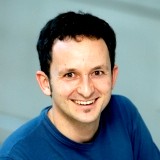ЙТЖРЕФСьгђ

ЁАEduardo MorenoЭЈЙ§ЕквЛДЮбЁдёЃЌвђЮЊЫћФЧЧПгаСІЕФМЭТМЃЌВЂЭЈЙ§зюКѓвЛТжЃЌетЙщЙІгкЫћЕФДДаТадЃЌЕЋОпгаКмЧПеыЖдадЕФПЦбаОЗбЃЌЁБХЗжобаОПЮЏдБЛсХуЩѓЭХжїЯЏSusan GasserаДЕРЁЃ
ЖдгквЛИіГЩЙІЕФжАвЕЩњбФЃЌвЛИіЦеБщЖјгжУїжЧЕФВпТдЃЌОЭЪЧЪЙФуЕФбаОПаЫШЄгыПЦбЇНчШЯЮЊЪЧШШЕуЧвДѓгаЯЃЭћЕФЯыЗЈНсКЯЦ№РДЁЃЕЋгаЪБгадЖМћОЭзуЙЛСЫЁЃЕБ37ЫъЕФЮїАрбРгяЗЂг§ЩњЮябЇМвEduardo Moreno ДђЫуЮЊвЛжжРЇЛѓПЦбЇМвУЧ30ФъЕФЯжЯѓзїНтЪЭЪБЃЌФЧЕБШЛЮовьгкНјаавЛГЁЖФВЉЁЃ

НёФъФъГѕЃЌОЙ§MorenaЫљЮНЕФЁАШ§ФъРДЪЕЪЉвЛИіМИКѕУЛгавЛИіЮїАрбРдожњЛњЙЙРяЕФШЫПДКУЕФЯюФПЁБЃЌЕБЫћвЛИіГфТњОКељЕФПЦбаОЗбЩъЧыжаНгЕНРДздХЗжобаОПЮЏдБЛсвЛАйЭђХЗдЊЕФНБН№ЪБЃЌетГЁЖФВЉЪЄРћСЫЃЌЁАЮвКмИпаЫНсЪЖвЛаЉХЗжозюгХауЕФПЦбЇМвЃЌЁБMorenoЫЕЁЃ
ЯШЙЄзїЃЌКѓгщРж
ЩњдквЛИіТЩЪІМвЭЅРяЃЌMorenoдкКЭХѓгбЭцЯдЮЂОЕКЭЛЏбЇЪдМСКаЪБГѕДЮГЂЕНПЦбЇЕФзЬЮЖЁЃЁАетдйНжЗЛСкРяЪЧвЛМўКмДѓЕФЪТЃЌЁБЫћЛивфЕРЁЃКѓРДЃЌЕБЫћЛЙЪЧИіЛЏбЇзЈвЕЕФБОПЦЩњЃЌЧвЗЂЯжСЫздМКЕФМЄЧщЃЌЫћВЮМгСЫдкТэЕТРязджЮДѓбЇПЊАьЕФЗЂг§ЩњЮябЇеаД§ЛсЁЃЁАЮвКмзХУдЃЌЮвЗЂЯждРДЖЏЮяЬхЪЧАДЙцТЩЙЙНЈЦ№РДЕФЃЌЁБЫћЫЕЁЃ
MorenoМгШыСЫGinЈІs MorataдкТэЕТРяSevero OchoaЗжзгЩњЮябЇжааФЕФЪЕбщЪвЃЌдкЫћЙЅЖСВЉЪПбЇЮЛЕФдчЦкЃЌЫћЫљгіЕНЕФвЛИіГЦЮЊЯИАћОКељЕФЯжЯѓЃЌМДЁАЦфжавЛжжЯИАћаЭЦєЖЏЃЌЦфЫћЯИАћаЭОЭЮоЗЈаЮГЩЩэЬхЕФвЛВПЗжЃЌЁБMorenoаЮШнЕРЁЃДгMorenoКЭЫћЕФЭЌЪТБЈИцетвЛЙлВьНсЙћвбОШ§ЪЎФъЙ§ШЅСЫЃЌЕЋЁАОпЬхЪЧдѕбљвЛИіЙ§ГЬКмКЌК§ЃЌгааЉШЫВЛЯраХетИіНсЙћЁБЁЃ Morata НЈвщMorenoЮЊЛёЕУВЉЪПбЇЮЛЫбМЏвЛаЉМсЪЕЕФЪ§ОнЃЌШЛКѓдйМЬајетИіУАЯеЕФЯюФПЃЌMorenoЛивфЕРЁЃ
MorenoЕФЕквЛЗнЙЄзїЪЧдкЪЕбщЪвАяжњвЛИіВЉЪПКѓбАевгеБфММЪѕЃЌвдШЗЖЈВЮгыЦїЙйЗЂг§КЭЖЈЮЛЕФаТЛљвђЃЌетЪЙЕУЫћвдЕкЖўзїепГіЯждквЛЦЊЗЂБэдкЁЖПЦбЇЁЗдгжОТлЮФЃЌОЭдкЫћПЊЪМЙЅЖСВЉЪПбЇЮЛВЛОУЁЃКѓРДЃЌЫћзЈаФбаОПЦфжавЛИіаТЗЂЯжЕФЛљвђЃЌМДЮВзЕЛљвђЃЌВЂМЧТМСЫЫќдкВдгЌЭЮВПаЮГЩЙ§ГЬЕФзїгУЃЌНсЙћгжЗЂБэвЛЦЊТлЮФЃЌетвЛДЮЪЧдкЁЖздШЛЁЗдгжОЩЯЃЌЧвЪЧЕквЛзїепЁЃетЙЄзїВЛНіЮЊЫћгЎЕУСЫВЉЪПбЇЮЛЃЌЛЙгаСНЯюживЊНБЯюЃЌРДздТэЕТРязджЮДѓбЇЕФЬиБ№НБКЭЮїАрбРЩњЮяЛЏбЇгыЗжзгЩњЮябЇСьгђЕФinnogeneticsЧрФъПЦбЇМвНБЁЃ
гщРжЪБМф
ЕБMorenoЪеМЏЭъгаЙиЮВзЕЛљвђЕФзЪСЯЃЌОрРы5ФъЕФВЉЪПЩњбФНсЪјЛЙгавЛФъАыЃЌЁААДНёЬьЕФбаОПНјЖШЃЌМИФъЕФЫФДІгЮЭцецЪЧвЛжжЩнГоЃЌЁБЫћЫЕЁЃЖдгкВЉЪПбЇЮЛЫћЪЄШЏдкЮеЃЌЫћЫЕгкЪЧЫћПЊЪМбаОПЯИАћОКељЁАЪЧЗёПЩвдгУЯжДњвХДЋбЇЗНЗЈРДбаОПКЭНтЪЭЁБЁЃ
дкФЧвЛФъЃЌКЭЫцКѓМИФъдкMorataЕФЪЕбщЪвзїВЉЪПКѓЃЈКѓРДгыKonrad BaslerвЛЦ№дкШ№ЪПЕФЫеРшЪРДѓбЇЃЉЃЌMorenoФмЙЛНЋвдЧАЯИАћЕФОКељЙТСЂЯжЯѓгыСМКУНЈСЂЕФГЬађадЯИАћЫРЭіСЊЯЕЦ№РДЃЌЫћМйЩше§ГЃЯИАћФмЙЛЗЂг§Й§ГЬжаЪЖБ№ДЮгХЯИАћЃЌВЂЦШЪЙЫћУЧЁАДѓСПЫРЭіЃЌЯёЯИАћШКжаЕФвЛИіЩњЬЌЯЕЭГЃЌЁБЫћЫЕЁЃЫћдкШ№ЪПжЄУїСЫИУМйЩшЃЌгжЗЂБэСЫвЛЦЊзїЮЊЕквЛзїепЕФТлЮФЃЈЁЖздШЛЁЗдгжОЩЯЃЉЃЌетЪЙЕУЫћгЎЕУСЫSevero OchoaЗжзгЩњЮябЇжааФЕФвЛИіНБЯюЃЌвдМАCharles Rodolphe BrupbacherЛљН№ЛсЕФЧрФъбаОПдБНБЁЃ
MorenoЛЙЗЂЯжСЫвЛИіВЮгыЯИАћОКељЕФШЫРрАЉжЂЛљвђЕФЭЌдДЛљвђЃЌЫћБэУїЃЌИУЛљвђжЛвЊБЛЦєЖЏЃЌОЭЛсАбе§ГЃЯИАћзЊБфЮЊЁАГЌМЖОКељепЃКПЩвдЪЙжмЮЇЯИАћШЯЮЊЫќУЧЪЧЛЕЕФЖјЧвМДНЋЫРЭіЕФЯИАћЁБЁЃ
УАЯеЕФЯыЗЈ
MorenoЛиЯыЦ№2005ФъдкТэЕТРяЕФЮїАрбРЙњМвАЉжЂбаОПжааФ(CNIO)ЕБ5ФъЕФаТЩњИЈЕМЃЌЦєЖЏCNIOзЪН№ЃЌCaja MadridКЭMutua Madrile?a ЁАШУЮвФмЙЛзібаОПЃЌВЂгаЯрЕБДѓЕФЦпШЫзщЃЌЁБЫћЫЕЁЃ
ЮЊСЫШУздМКГЩЮЊвЛИіЖРСЂЕФПЦбЇМвЃЌЫћБиаыЯыАьЗЈЛёШЁзЪжњЃЌЮїАрбРПЦбЇВПЪЧУїЯдЕФРДдДЁЃЕЋЫћЕФзЪжњЩъЧыБЛВЕЛиЃЛЩѓХаЙйЩљГЦЫћЬЋУЛгаОбщЖјВЛзувдГаЕЃШчДЫКъДѓЕФЯюФПЁЃШЛКѓЃЌЫќдйвЛДЮБЛЗёОіЃЌвЛДЮгжвЛДЮЁЃ ЁАЖдЮвРДЫЕЃЌЫќГЩЮЊИіШЫЕФЪТЧщЃЌЮвецЕФЯывЊетИіЯюФПЃЌЖјЮвЁ ВЛЖЯЕФЕнГіЩъЧыЃЌЯЃЭћПЦбЇВПШЯЪЖЕНЫћУЧЕФДэЮѓЃЌЁБЫћЫЕЁЃ
![]() ТэЩЯЗвы!
ТэЩЯЗвы!
ЙТЖРЕФСьгђ
EЛЏЪБДњПДВЁЃКAT&TНЈСЂЕчзгвНбЇаХЯЂЯЕЭГ
ЛњгіЃКджФбЕФжїдз
ШМЩевЌзггЭЕФЗЩЛњ
"Eduardo Moreno made it through the first selection because of his strong past record and made it through the last round thanks to the innovative, yet highly relevant, nature of his grant," writes ERC jury panel chair Susan Gasser.
A common and sensible strategy for a successful career is to align your research interests with ideas the scientific community thinks are hot and promising. But sometimes a long shot really pays off. When Spanish developmental biologist Eduardo Moreno, 37, set to provide an explanation for an observation that had puzzled scientists for 30 years, he certainly was taking a gamble.
Earlier this year, after what Morena calls "3 years of carrying on a project that almost nobody within the Spanish funding agencies believed in," the gamble paid off when he received an award of 1 million from the European Research Council in a highly competitive research funding call. "I was very happy to get some validation by the best scientists of Europe," Moreno says.
Work first, play later
Born to a family of lawyers, Moreno explored an early taste for science playing with microscopes and chemistry kits with friends. "It was a big thing in the neighborhood," he recalls. Later, he attended a development biology conference at the Universidad AutЈЎnoma de Madrid while he was a biochemistry undergrad and discovered his passion. "I was fascinated that there were rules to construct the body of animals," he says.
Moreno joined the lab of GinЈІs Morata at the Severo Ochoa Molecular Biology Centre in Madrid. Early in his Ph.D., he encountered a phenomenon called cell competition whereby "one of the cell types start[s] not allowing the other cell type to form part of the body," as Moreno puts it. Thirty years had passed since Morata and colleagues had reported the observation, but "it was very obscure what was going on there. Some people didn't believe [in] it." Morata advised Moreno to gather some solid data for a Ph.D. before taking on such a risky project, Moreno recalls.
Play time
When Moreno finished gathering data on the caudal gene, he still had a year and a half before the official completion of his 5-year Ph.D. "The pace that research goes today, it's almost a luxury to have a couple of years to play around," he says. His Ph.D. secure, he says he set out to see if cell competition "was a topic we could study with modern genetics methods and explain it."
During that year, and subsequent years spent as a postdoc in Morata's lab (and later with Konrad Basler at the University of Zurich, Switzerland), Moreno was able to link the previously isolated phenomenon of cell competition to the well-established process of programmed cell death. He hypothesized that normal cells were able to recognize suboptimal cells during development and force them to die, "a lot like an ecological system in a population of cells," he says. He proved the hypothesis in Switzerland and published another first-author paper (this one in Nature). The result won him a prize from the Severo Ochoa Molecular Biology Centre and the Young Investigator Award from the Charles Rodolphe Brupbacher Foundation.
Moreno also found a homologue of a human cancer gene involved in cell competition. He demonstrated that, when activated, this gene could transform regular cells into "supercompetitors: cells that Ё are able to make the surrounding cells believe that they are bad cells and Ё [need] to die."
A risky idea
Moreno was pulled back to Spain in 2005 by a 5-year junior-leader position at the Spanish National Cancer Research Centre (CNIO) in Madrid. Start-up funding from CNIO, Caja Madrid, and Mutua Madrile?a "allowed me to do research and have a relatively big group of seven persons," he says.
To establish himself as an independent scientist, he had to attract grant money, and the Spanish Ministry for Science was the obvious source. But his grant application to the Spanish ministry was rejected; the judges claimed the he was too inexperienced to take on such an ambitious project. Then it was rejected again, and again, and again. "For me, it became personal. I really wanted this project, and I Ё kept sending it in the hope [the ministry] would realize their mistake," he says.
The vote of confidence--and investment--Moreno sought eventually came from a less likely source: the European Research Council (ERC). In one of the most competitive funding calls of European history, Moreno won an ERC Starting Independent Researcher Grant, worth 1 million, to fund his research during the next 5 years. "We had 720 applicants to our panel for 18 grants; in other words, only 2-3% got funded," writes Susan Gasser, chair of the ERC jury panel that made the award, in an e-mail to Science Careers. "Eduardo Moreno made it through the first selection because of his strong past record and made it through the last round thanks to the innovative, yet highly relevant, nature of his grant, and his compelling presentation of his ideas."





